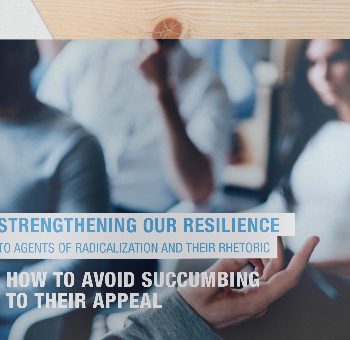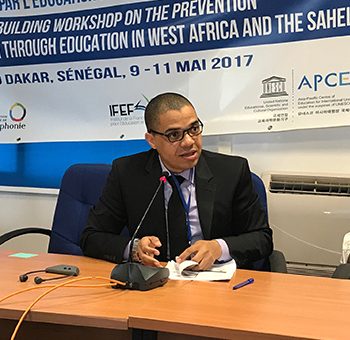
The CPRLV is very pleased to have received several participating organizations to present their youth initiatives at an evening event organized to highlight the creativity of young people involved in their communities and the importance of their contributions to advancing living together.
During this evening, participants had a platform to present their artistic works or concrete actions to the public, to be inspired by them and to meet young people from different backgrounds for whom reflections on the issues related to living together were also translated into concrete initiatives:
- Short
film “Faire la différence dans l’indifférence”,
collective of the Collège de Rosemont:
the Collège de Rosemont presented its artistic work that had been submitted for the “What If I Was Wrong? When We talk, We Learn!” campaign contest of the CPRLV. This video reflects the theme “That’s none of my business” and the importance of paying attention to what’s going on around you, because actions can make a difference in someone’s life, for example, when you witness an act of discrimination. - Poem
“Les plaines d’Abraham de mon Sahara”, by Safoua Taoussi:
A young student read a piece submitted for the “What If I Was Wrong? When We talk, We Learn!” campaign contest of the CPRLV, on the theme “I don’t fit in here”. - Digital
photo “Broken”, by Victoria-Mae Carrière:
Artistic work created by a young student as part of the “What If I Was Wrong? When We talk, We Learn!” campaign contest of the CPRLV, which speaks of marginalization in society. - “Philo-Box”,
by Karim Coppry:
The “Philo-Boxe” project is the result of several years of intervention with young people around high schools to prevent street gang membership. The challenges faced by its young people from culturally diverse backgrounds largely affect the management of emotions and the mastery of expected social skills. These challenges translate into behavioural disorders and recurrent conflicts in the school environment. On the other hand, the current social climate leads to polarizations in both discourse and behaviour and thus limits the movement of young people between different communities, which creates ethnic groups. Living together is therefore weakened by these different aspects since young people in secondary school have not yet developed critical thinking, which influences their ability to judge. They are therefore at greater risk of being dragged into marginal paths to meet their needs for security, belonging and social justice. - “Les
jeunes examinent les Appels à l’action pour la vérité et la réconciliation“, by Marie
Plamondon:
The project “Les jeunes examinent les Appels à l’action pour la vérité et la réconciliation“ is being launched by the United Nations Association of Canada and Canadian Heritage to raise awareness of Aboriginal issues among 400 young people across Canada. It is aimed at young people aged 15 to 25 living in Montreal, Ajax, Toronto and Vancouver to discuss the Truth and Reconciliation Commission’s calls for action and the United Nations Declaration on the Rights of Indigenous Peoples (UN-DNUPA). - “Youth Inclusion – Youth Inclusion”:
This is a project by and for young people working on issues of inclusion and representativeness within youth organisations. Considering that certain segments of the population, such as young people, racialized people or gender minorities, are poorly represented in municipal political bodies, whether because of structural causes (notably ageism, racism, sexism, etc.), a lack of access to information or individual behaviour within places of power, Mélanie and her team consider it essential to fight systemic barriers to inclusion, which guarantees a richer and more just democratic life. - “Le grand rassemblement jeunesse en santé mentale”, by
Emmanuelle Saulnier-Leclerc and Kharoll-Ann Souffrant:
The GRJ-SM is an evolving project that aims to create and consolidate an identity community of young Quebecers aged 16 to 35 with experiential knowledge in mental health (JSM) led by, for and with those in a perspective of collective empowerment. It is entirely run by a committee of young people with diverse profiles (in terms of identities, interests, etc.), who share the fact that they have a mental health background, and these young people are supported by mental health organizations called organizational allies. The objective of this project is to create and strengthen an identity community of young people with experiential mental health knowledge, led by, for and with them. - “Youth Engagement Summit”, by Dominique Berrardelli:
The Youth Engagement Summit, is an annual outdoor civic engagement event held at Camp Y Kanawana in Saint-Sauveur. It aims to develop the leadership skills of young people aged 14 to 18, as well as to equip them to become agents of change. This is done through conferences, outdoor activities, art and discussion circles. The topics covered vary each year; here are some examples of topics: reality of Aboriginal people, the LGBTQ+ community, the environment, feminism, mental health, sport as a means of social integration, international solidarity, and more. It is an event organized in collaboration with The YMCAs of Québec. - “Comité Empreinte” of the polyvalente Saint-Henri supported
by Ensemble, by Grace Skahan of Ensemble and students from the polyvalente
Saint-Henri:
The “Empreintes project” is a support program for high school student committees aimed at promoting respect for diversity and combating intolerance and its manifestations, discrimination and intimidation. This program follows the formula “by and for” young people. Guided by a Ensemble pour le respect de la diversité project manager, student committees identify an issue of intolerance in their school, develop an action plan and set up, throughout the year, awareness and mobilization activities for a positive transformation of their school environment.
The CPRLV would like to thank all those who participated in this event, which was part of the Action week against racism.
- Posted by info-radical
- On 25 March 2019
- 0 Comments




0 Comments